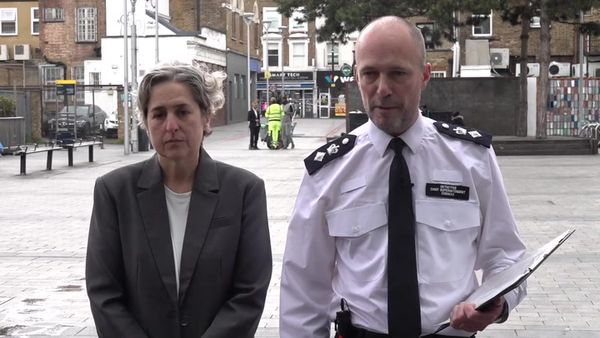
Shane Drumgold has mounted a legal challenge to the Sofronoff inquiry’s damning findings against him.
The ACT’s outgoing director of public prosecutions has asked the territory’s supreme court for a judicial review of the inquiry report, one month after it was leaked to the media and subsequently released by the government.
Drumgold’s application for judicial review is the latest in a long line of legal proceedings stemming from the Bruce Lehrmann case.
Here’s what Drumgold alleges the inquiry did wrong – and what could happen next.
Why was the inquiry held?
The ACT government established an inquiry earlier this year after bombshell allegations outlined by Drumgold in a private letter to the police chief Neil Gaughan about the handling of the investigation and prosecution of Lehrmann.
Lehrmann faced trial for allegedly raping Brittany Higgins, a fellow political staffer, in Linda Reynolds’ office. Lehrmann denies the allegation. The trial was aborted and Drumgold, the director of public prosecutions who ran the case, called off a planned retrial due to concerns about Higgins’s mental health.
In his letter, Drumgold accused police of aligning themselves with Lehrmann’s defence and called for a public inquiry, an allegation later found to be baseless.
The ACT government selected Walter Sofronoff KC, a former Queensland judge, to lead the probe and asked him to examine the conduct of both police and prosecutors.
Sofronoff’s report was damning of Drumgold’s conduct. It found that, although he was correct in bringing the case, he lost objectivity, misled a court, and wrongly tried to keep material from the defence.
Sofronoff created significant controversy by handing his report to two selected journalists prematurely, on the condition it not be published until released formally by the government.
One journalist was handed the report before the chief minister, Andrew Barr, saw a copy.
Its contents were subsequently published in the media, prompting fury within the ACT government and leading Barr to allege a potential breach of the Inquiries Act and a denial of fairness to Drumgold.
What is a judicial review?
Drumgold’s application asks a court to conduct a judicial review of the Sofronoff findings.
Judicial reviews are designed to ensure that decisions made by public authorities – in this case, the board of inquiry – are legal, reasonable and fair. Such reviews do not usually focus on the merits of a decision, but rather whether it was made properly according to law.
Anthony Whealy, a former New South Wales supreme court judge, said it is often difficult to win an application for judicial review. The grounds for a judicial review are narrow, he said.
“The first thing you’d say is, generally speaking, it is very hard to get a positive outcome from a judicial review application, because it is not an appeal on the merits, it’s a limited appeal and the grounds of appeal are limited,” he said.
He said judicial reviews can only be successful where a decision-making body had no jurisdiction to make the findings that it did, where it made findings not available on the material before it, or where procedural fairness is denied.
Judicial reviews can also be successful if a body took something into account that it shouldn’t have in making a finding, or failed to take something into account that it should have. They can also be successful where a body made legally unreasonable findings.
What is Drumgold alleging?
Court documents show Drumgold is asking for a judicial review on multiple grounds.
He says many findings against him were made unreasonably, that he was denied a fair hearing, that the inquiry breached the law through the unauthorised disclosure of material, and that he was denied natural justice due to “a reasonable apprehension of bias”. He also says some of the findings made by the inquiry were outside its remit.
He will ask the court to quash the report entirely or declare it invalid and of no effect. Alternatively, Drumgold seeks to have the findings made against him specifically quashed or declared invalid.
What findings does Drumgold say were unreasonable?
Drumgold is contesting scathing findings about his handling of Higgins’s counselling notes.
Those notes were erroneously sent to Lehrmann’s defence by police, a mistake police later apologised for. Upon learning of the error, Drumgold himself read a copy of the notes to gauge the risk it posed to Higgins.
The inquiry found he shouldn’t have read the notes and that doing so gave him an unfair advantage over the defence, which had not read them. It said he failed in his duty as a prosecutor by not considering whether he ought to disclose the notes or take steps to address the unfairness.
Drumgold says the finding was unreasonable.
He also says it was unreasonable for the inquiry to find he had a duty to warn Lisa Wilkinson not to give her infamous Logies speech, which delayed the Lehrmann trial, or that he “knowingly lied” to the court about the preparation of a file note concerning a meeting with the broadcaster.
Another key finding Drumgold sees as unreasonable concerned his interrogation of Reynolds during the trial, which Sofronoff found to be “grossly unethical”.
Drumgold suggested to Reynolds that she was politically invested in the outcome of the trial and had acted inappropriately by requesting transcripts from Lehrmann’s defence team and allowing her husband to be in the public gallery during proceedings, prior to her giving evidence.
Court documents show Drumgold will also say it was unreasonable for the inquiry to find he made “improper” comments when publicly announcing Lehrmann’s retrial would not proceed.
What happens next?
The application for judicial review will first be mentioned before the ACT supreme court on 14 September. The court will later decide whether to conduct a judicial review.
If it conducts such a review and Drumgold is successful, it can set aside or quash the original decision, refer it back to the decision-maker for further consideration, declare the rights of Drumgold or other parties, and direct that other parties refrain from certain actions.
In this case, Drumgold seeks to refrain the attorney general, Shane Rattenbury, from taking actions against him on the basis of the report.
Whealy said a court would be unlikely, in this case, to send the matter back to Sofronoff for further inquiry and new findings.
• In Australia, the crisis support service Lifeline is 13 11 14. International helplines can be found at befrienders.org





